What do your working hours in a work week look like in Japan as a full-time employee? And what if you’re a part-timer? Study up about the important things you need to know, and your rights, as an employee in terms of working hours and working conditions, and discover the new changes in Japan’s work culture.
First Posted: 2022-02-04
Updated: 2025-05-07
Table of Contents
- Full-Time Working Hours and Work Week in Japan
- Non-Regular and Non-Full-Time Working Hours and Work Week in Japan
- What is an average work week in Japan like?
- Recent Changes in Japanese Work System
- Japanese Vocabulary Lesson on Working Hours
- Find a Job in Japan with WeXpats
 Are you having any issues with job-hunting in Japan?
Are you having any issues with job-hunting in Japan?
Full-time Work Hours and Work Week in Japan

Designated Work Hours in a Week in Japan
Compared to the notorious number of working hours recorded in the late 90s, sometimes up to 60 hours a week, reforms in the Labour Act lowered it considerably to a standard 40 hours with a maximum of 8 work hours per day. This is known as statutory working hours usually observed in the Fixed System or your normal 8-to-5 job in a 5-day workweek. It includes, of course, the mandatory 1 hour long break you earn for working 8 hours (45 minutes break if you work 6 hours).
Overtime in Japan
But of course, as you may have heard and it’s often talked about, not every Japanese company adheres strictly to these work hours especially with the concept of overtime. After all, the limits for overtime exist, set into place to curb the amount of overtime many company employees were expected to do to keep up with the workload. The cap is 15 hours of overtime in a week and 45 hours a month. This is either compensated for the amount worked overtime, or a certain number of hours of overtime may already be worked into your contract and monthly salary (whether you work the overtime or not).
As the government states
Companies must pay an increased rate of wages as set forth in the table below to employees who work in excess of statutory working hours, work on statutory days off or work late at night (between 22:00 and 05:00)
- Japan External Trade Organization (JETRO), "Section 4. Human Resource Management 4.5 Legislation on working hours, breaks and days off"
Companies must pay a 25% rate increase if working overtime past statutory hours, 25% rate increase if working late at night, and a 35% rate increase if working on statutory days off. More is offered in special circumstances, such as exceeding 60 hours in a month in the first two mentioned categories.
Days Off & Paid Leave
You get a minimum of 1 day off per week but most jobs will give you 2 days off per week. Some are consecutive, such as the typical Saturday and Sunday off, but some are non-consecutive days off.
As for paid leave, you get a certain number of days for how long you’ve worked. For a full-time employee (or anyone who works 30 hours or more), you get 10 days of paid leave per year after working 6 months in the company. This increases based on how many years you have worked continuously with your employer. Depending on the company, those days may roll over to the next year if unused. Recent legislation however requires full-time employees to take a certain amount of paid vacation days per year - 5 days to be exact.
Modified Working Hours System

Japan's Labour Act has also provided a modified working hour system that allows companies and establishments some freedom and flexibility for workers and companies in counting working hours and how they work throughout the week. Your workweek may look different depending on which system your company adopts.
1. Annual or Monthly Modified Working Hours
An average of 40 hours a week are worked out for anywhere between a month and a year year (annual modified working hours) or the number of hours worked per week have to average out to 40 per week up to a month (monthly modified working hours) if there’s a specific reason that employees must exceed the statutory working hours in a certain period of time, which could be a day/week/months.
2. Week-based Modified Working Hours
Employees can work up to 10 hours a day in the following conditions:
-
They still stay within a cap of 40 hours a week
-
They work in lodging, restaurants or retail
-
Their workplace has a maximum of 29 regular employees
3. Flextime System
Employees are responsible for working a certain number of hours within a fixed period but can decide for themselves how they go about doing that on a daily basis, such as what time they start working - of course with prior agreement with their employers. They may be asked to observe Core Hours when everyone is expected to be working.
4. Discretionary Working Hours
Also a special system for professions that involve planning work or professional services whose working hours can be hard to define, such as if a portion of their work hours are outside of the office or it requires long hours, used with prior agreement with their employer. Salary is based on a predetermined fixed number of hours, which means one can leave or stop working for the day once the required work is finished regardless of the number of hours worked, with overtime pay and overnight premiums being paid if applicable.
We referenced the following two sources for this section about full-time employment in Japan. Please refer to them for more details and information:
※ Japan External Trade Organization (JETRO), "Section 4. Human Resource Management 4.5 Legislation on working hours, breaks and days off" ※ THE FOREIGN WORKERS’HANDBOOK (2021 English Edition), "Working Hours, Holidays and Annual Leave" p.38-44
Writer's Pick
How About Non-Regular and Non-Full Time Employees?
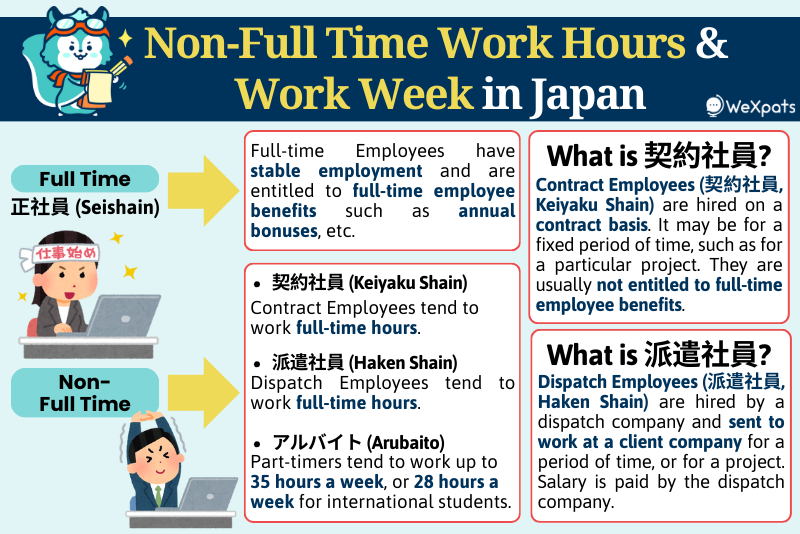
It’s hard to say how many hours you might find yourself working if you’re not a 正社員 (seishain, full-time employee). However, even if you’re not, there’s a chance you’ll still be working full-time hours - especially if you are a contract (契約社員 keiyaku shain) or dispatch worker (派遣社員 haken shain). This means your contract type is different, and may mean that you're not entitled to certain benefits of full-time employees such as annual bonuses, or are employed for a predetermined period of time, such as for a particular project.
Part-time workers tend to work about 35 hours per week, while students working part-time are only allowed up to 28 hours of work per week.
One difference between these types of workers and full-time workers is that as you are paid to work a set number of hours, you shouldn’t be expected to do much overtime.
Working Holiday
Under the Working Holiday Program, you are allowed to work in Japan for the purpose of using those funds for traveling when you're not working.
There are a variety of jobs you can do, and if you wish, you can even work full-time hours. Read more about Working Holidays in Japan here.
So What Are Some Common Traits of a Japanese Work Week?
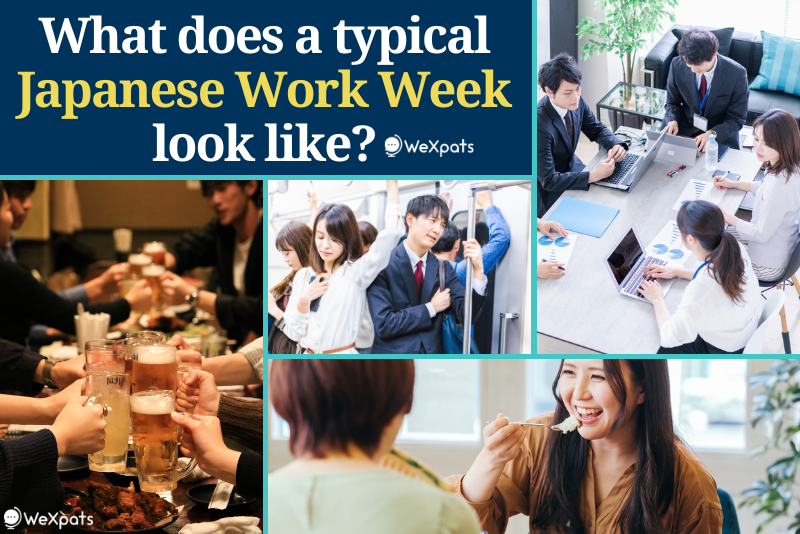
Whether you’re full-time or part-time, here are some common things you might experience during your work week.
-
Commute - While you may be able to avoid the rush hours if your job starts later than most, chances are, you’ll be in a train with lots of other people or stuck in traffic if you commute by car. And if you’re lucky to skip the morning rush, you might end up in the evening rush home.
-
Meetings - Japanese companies just simply love their meetings, even if the employees don’t. Whether it be for the managers to inform employees of something, or a department wide check in, or multiple meetings for projects, you’ll often find yourself in at least one, usually several, meetings per week.
-
Lunch/Dinner/Drinks with Coworkers - Spending time together even during “off-the-clock” hours is quite typical in a Japanese workplace. Depending on your workplace, this might mean team lunches, dinners or after work drinks aka Nomikai.
Read more about Japanese Work Culture here: Japan’s Work Culture: Things to Know Before Working in a Japanese Company
Recent Changes in Japanese Work System

So will this “typical” work week schedule with the long hours ever change? Japan has always been known to have a workaholic culture but it is taking steps towards curbing the death toll caused by overworking (karoshi) not just in its policies but also in its company practices. For example, in 2019, Microsoft Japan conducted an experiment on employing a 4-day workweek. The one month trial showed results of boosted productivity by 40%, as well as reduced expenses on company resources like electricity, and ultimately gave employees more time to rest and enjoy a healthier work-life balance. Panasonic also experimented with a 4-day workwear in 2022. As for Japanese companies that have permanently implemented 4-day workweeks, as of April 2023, there’s Mizuho Bank and Cross River tech company.
While not many companies in Japan are experimenting or implementing a 4-day work week, there are quite a number of companies that have adopted a new type of working style - working from home. The change was brought about by the onslaught of the pandemic to avoid the spread of the coronavirus in workplaces, and during the worse of the pandemic, the Japanese government actively encouraged and offered subsidies to companies that joined the remote-work style of working.
Even now that the situation in Japan has improved and things have for the most part gone back to pre-covid conditions, there are quite a number of companies that have permanently implemented partial or full remote-work. Not only do employees get to work from the comfort of their own home, companies could save on building costs. According to a survey conducted by Japanese sales support company Eigyou Hack, the implementation rate of full remote work in Japan post-coronavirus is approximately 32%. The biggest reason that Japanese companies are reluctant to implement remote work is the issue of “communication” with many feeling that remote work negatively impacts and declines the quality of communication, while the biggest reason people are for remote work is to reduce the stress of commuting.
※ CNBC, “4 countries that are embracing—or experimenting with—the 4-day workweek” [2023-04-13] ※ NPR, "4-Day Workweek Boosted Workers' Productivity By 40%, Microsoft Japan Says"[2019-11-04] ※ PR Times, “アフターコロナにおけるフルリモートワークの実施率は約32%。2023年のテレワーク実施率調査を営業ハックが実施しました” [2023.07.25]
Japanese Vocabulary Lesson on Working Hours
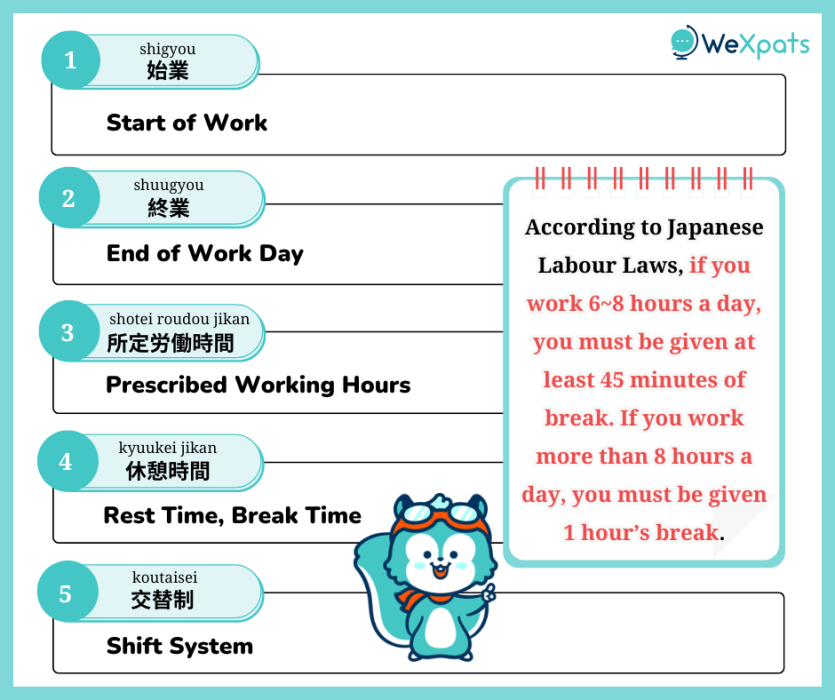
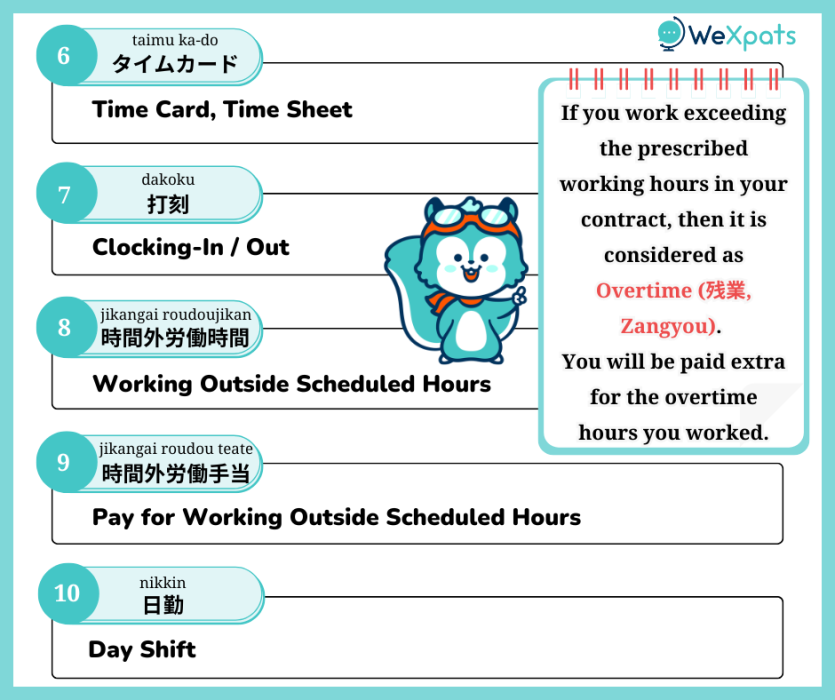
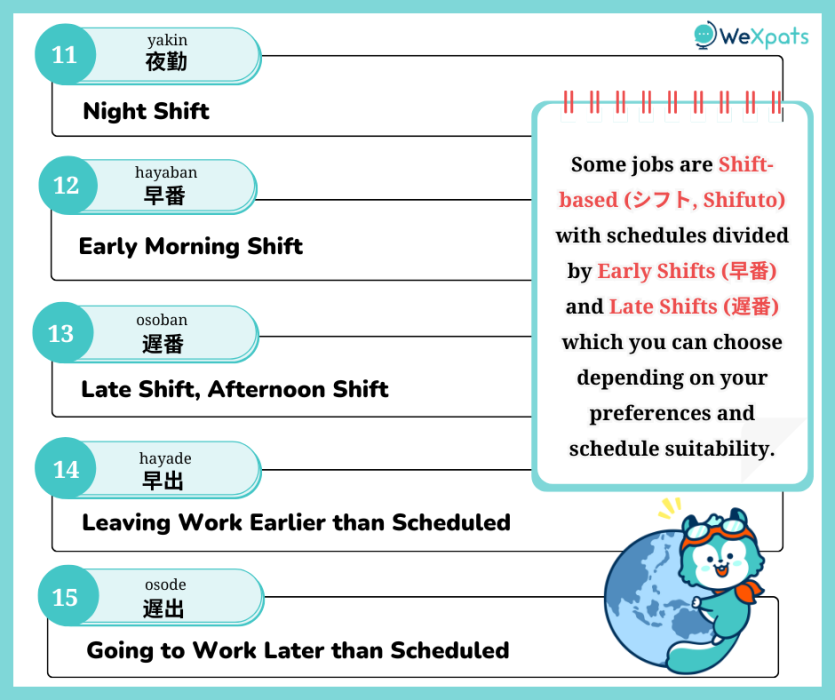
Find a Job in Japan with WeXpats
We hope this gave you a brief taste of what working hours and a work week in Japan might look like. As younger generations begin to become of working age, the “typical” in Japan may continue to change, to allow people a better work-life balance as well as more freedom to be productive however that may look like. We hope you find a company that best fits your style!
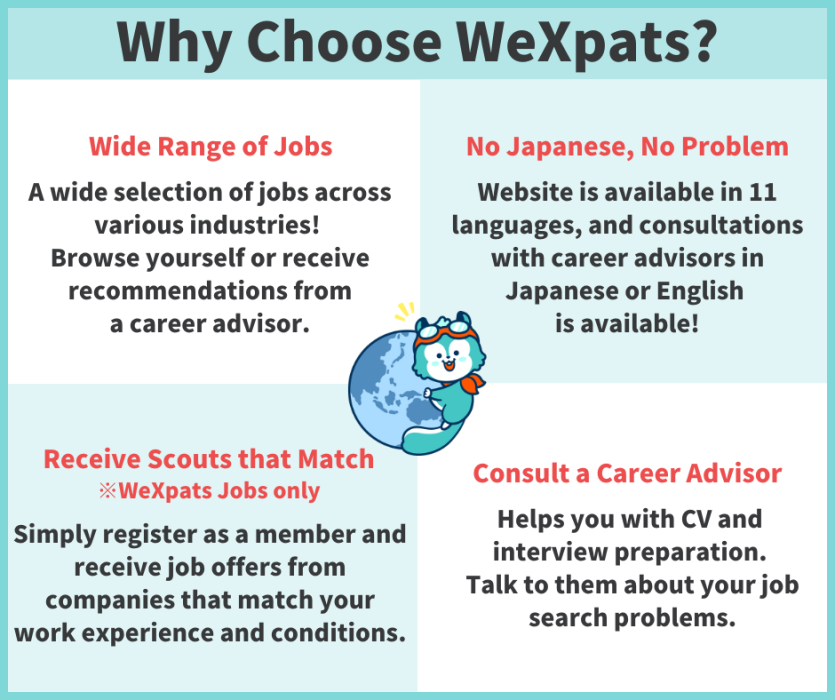
WeXpats operates a service for foreign nationals who want to work in Japan. There are jobs in a variety of industries. There are 2 services available on WeXpats - WeXpats Agent for full time jobs and WeXpats Jobs for part time jobs.
Looking for a Full Time Position? Leave it to WeXpats Agent!
WeXpats Agent is a career support service that specialises in employment for foreign nationals living in Japan.
Recruitment agencies in Japan are a service where dedicated career advisors will assist you with your job hunt for free. In addition to introducing open positions, we also provide support to help you create your Japanese resume and practice for interviews. Worried about job hunting in Japanese? We are here for you.
Features of WeXpats Agent
-
We have many job openings that are a good fit for foreign nationals to work in, such as translation, interpretation, inbound, etc. jobs that make use of your language skills, as well as engineering etc. jobs that do not require Japanese skills.
-
Our career advisors support and help you prepare your resume and practice job interviews with you. Clearly communicate your strengths to the hiring company.
-
We will handle communication with companies on your behalf, such as arranging interview dates and negotiating conditions. And thereby reducing your stress and time spent.
Finding a Part Time Job? Browse on WeXpats Jobs!

WeXpats Jobs is a part time job site for foreign nationals living in Japan. You can search for jobs in 11 languages (English, Vietnamese, Korean, Indonesian, Traditional Chinese, Simplified Chinese, Burmese, Thai, Spanish, Portuguese), including Japanese. Find jobs that suit you by specifying your Japanese language level, occupation, location, and etc.
※ You can register from outside Japan, but only those living in Japan can apply for jobs.




































